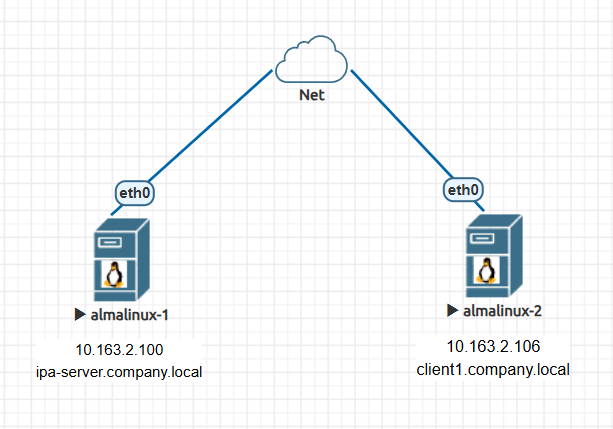集中认证服务器的类型
基于LDAP的集中认证系统 基于kerberos的集中认证系统 基于OAuth或OpenID Connect的集中认证系统(互联网APP常用)
1 2 3 4 5 6 7 8 9 10 11 12 13 集中认证系统技术演进 │ ├── 企业内网时代 │ ├── LDAP (用户信息存储) │ ├── Kerberos (强认证协议) │ └── FreeIPA/Samba AD (集大成者) │ ├── Web单点登录时代 │ └── SAML (企业级SSO标准) │ └── 现代互联网时代 ├── OAuth 2.0 (授权框架) └── OpenID Connect (认证层,基于OAuth)
特性
FreeIPA
Samba AD (作为DC)
OpenLDAP
核心定位 一体化的Linux身份管理
开源的Active Directory替代品
灵活轻量的LDAP目录服务
管理Linux 完美 优秀 优秀 (需额外配置)
管理Windows 良好 (需建立信任)
完美 (原生支持)基础 (仅LDAP)
易用性 高
高
中低
一体化程度 高 (集成DNS, CA等)
高 (集成DNS, CA等)
低 (需自行集成)
主要协议基础 LDAP + Kerberos LDAP + Kerberos 纯LDAP
详细说明 集成了完整的LDAP目录服务和Kerberos认证,是典型的企业内网统一认证系统
完全模拟Windows AD,核心就是LDAP目录+Kerberos认证协议
提供基础的目录服务,通常需要与其他组件(如Kerberos)配合完成完整认证
FreeIPA 在FreeIPA中,我们使用Kerberos领域(realm)和DNS域(domain)来构建一个统一认证系统。
Kerberos领域(realm):这是Kerberos认证系统使用的标识,通常是大写的域名。例如,COMPANY.LOCAL。
DNS域(domain):这是标准的DNS域名,例如company.local。
如果将FreeIPA服务器的领域设置为COMPANY.LOCAL,域名设置为company.local
那么客户端也应该使用company.local作为其DNS搜索域,并且主机名应该是该域名下的一个FQDN(完全合格域名),例如client1.company.local。
部署freeipa-server
1 2 3 4 5 6 7 8 9 10 11 12 13 14 15 16 17 18 19 20 21 22 23 24 25 26 27 28 29 30 31 32 33 hostnamectl set-hostname ipa-server.company.local && bash timedatectl set-timezone Asia/Shanghai systemctl disable firewalld.service --now yum -y install freeipa-server freeipa-server-dns freeipa-client ipa-server-install 参数说明 --realm --ds-password --admin-password --unattended --setup-dns --auto-forwarders ipa-server-install \ --realm COMPANY.LOCAL \ --domain company.local \ --ds-password wangsheng12345 \ --admin-password wangsheng \ --hostname ipa-server.company.local \ --setup-dns \ --auto-forwarders \ --unattended 在windows上添加解析: 10.163.2.100 ipa-server.company.local 通过网页访问: https://ipa-server.company.local 用户admin 密码wangsheng
创建用户 创建用户可以在web端进行手动创建,也可以通过命令行进行创建,这里介绍使用命令行创建的方法
1 2 3 4 5 6 7 8 9 10 11 12 13 14 15 16 17 18 19 20 21 22 23 24 25 26 27 28 29 30 kinit admin ipa user-add xhy --first=xue --last=huiying --email=test @example.com --password Password: Enter Password again to verify: ---------------- Added user "xhy" ---------------- User login: xhy First name: xue Last name: huiying Full name: xue huiying Display name: xue huiying Initials: xh Home directory: /home/xhy GECOS: xue huiying Login shell: /bin/sh Principal name: xhy@COMPANY.LOCAL Principal alias : xhy@COMPANY.LOCAL User password expiration: 20251011081813Z Email address: test @example.com UID: 1251600003 GID: 1251600003 Password: True Member of groups : ipausers Kerberos keys available: True id xhyuid=1251600003(xhy) gid=1251600003(xhy) groups =1251600003(xhy)
client加入域 1 2 3 4 5 6 7 8 9 10 11 12 13 14 15 16 17 18 19 20 21 22 23 24 25 26 hostnamectl set-hostname client1.company.local && bash timedatectl set-timezone Asia/Shanghai systemctl disable firewalld.service --now yum install ipa-client -y echo "nameserver 10.163.2.100" > /etc/resolv.confecho "search company.local" >> /etc/resolv.confhost ipa-server ipa-server.company.local has address 10.163.2.100 ipa-client-install \ --domain=company.local \ --realm=COMPANY.LOCAL \ --server=ipa-server.company.local \ --principal=admin \ --password=wangsheng \ --unattended ... The ipa-client-install command was successful
验证:在client上使用xhy用户 1 2 3 4 5 6 7 8 9 10 11 12 13 14 ssh xhy@client1.company.local (xhy@client1.company.local) Password: (xhy@client1.company.local) Password expired. Change your password now. Current Password: (xhy@client1.company.local) New password: (xhy@client1.company.local) Retype new password: Last failed login: Sat Oct 11 16:28:51 CST 2025 from 10.163.2.106 on ssh:notty There were 2 failed login attempts since the last successful login. Last login: Sat Oct 11 16:23:29 2025 Could not chdir to home directory /home/xhy: No such file or directory [xhy@client1 /]$ 成功登录了
